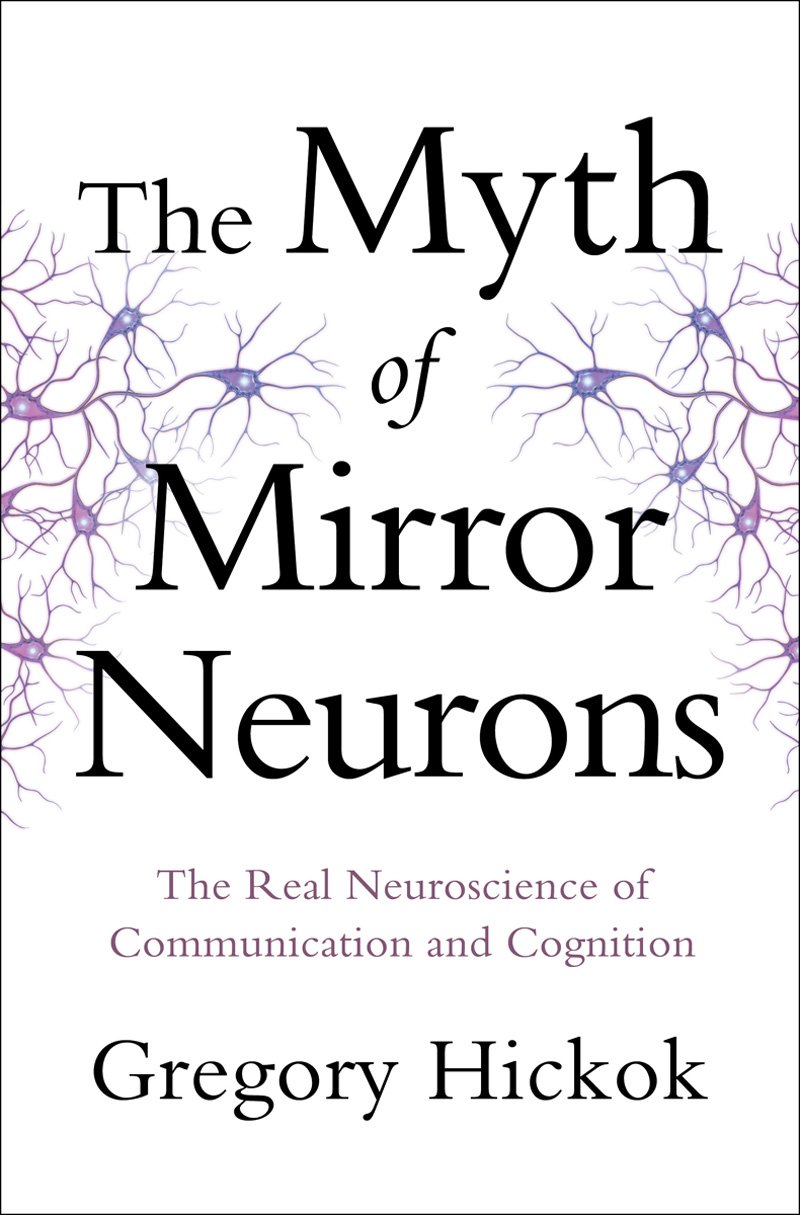
Gregory Hickok is the author of The Myth of Mirror Neurons: The Real Neuroscience of Communication and Cognition (2014), and he was the guest on the most recent episode of the Brain Science Podcast, hosted by Dr. Ginger Campbell.
This is from the Amazon ad copy for the book:
In The Myth of Mirror Neurons, neuroscientist Gregory Hickok reexamines the mirror neuron story and finds that it is built on a tenuous foundation—a pair of codependent assumptions about mirror neuron activity and human understanding. Drawing on a broad range of observations from work on animal behavior, modern neuroimaging, neurological disorders, and more, Hickok argues that the foundational assumptions fall flat in light of the facts. He then explores alternative explanations of mirror neuron function while illuminating crucial questions about human cognition and brain function: Why do humans imitate so prodigiously? How different are the left and right hemispheres of the brain? Why do we have two visual systems? Do we need to be able to talk to understand speech? What’s going wrong in autism? Can humans read minds?Sounds like a great book and an important counter-balance to all of the hype being piled on the concept of mirror neurons since their discovery.
The Myth of Mirror Neurons not only delivers an instructive tale about the course of scientific progress—from discovery to theory to revision—but also provides deep insights into the organization and function of the human brain and the nature of communication and cognition.
What Do Mirror Neurons Really Do? (BSP 112)
October 16, 2014/ Ginger Campbell, MD
Greg Hickok, PhD
Ever since their chance discovery back in 1992 mirror neurons have captured the imagination of both scientists and nonscientists, but their actual role remains mostly speculative. In The Myth of Mirror Neurons: The Real Neuroscience of Communication and Cognition, Dr. Gregory Hickok (UC-Irvine) explains why the most popular theory is probably wrong. He also provides a fascinating account of how science is really done and the sobering lesson that scientists can fall prey to the same cognitive biases (and tendencies toward laziness) that plague all humans.
I first discussed the discovery of mirror neurons back in BSP 35 when I featured Mirrors in the brain: How our minds share actions, emotions, and experience (2008) by Giacomo Rizzolatti and Corrado Sinigaglia. At that time what I found most fascinating was that since mirror neurons fire both when a subject (usually a monkey) performs an action and when a similar action is observed, this proves that single neurons are not necessarily purely motor or purely sensory. This surprising discovery seems to have been overshadowed in the rush to use mirror neurons to explain everything from autism to language evolution.
The latest Brain Science Podcast (BSP 112) features an interview with Dr. Gregory Hickok. BSP 35 is also available for FREE via the Brain Science Podcast Mobile APP.
Play podcast.
(Click to stream, right click to download OR go to BSP site to listen)
How to get this episode:
The most recent 25 episodes of the Brain Science Podcast are still FREE. See the individual show notes for links the audio files.
- FREE: audio mp3 (click to stream, right click to download)
- Buy Episode Transcript for $1.
- Premium Subscribers now have unlimited access to all old episodes and transcripts.



References and Links
Announcements:
- Greg Hickok's Talking Brains blog
- The Myth of Mirror Neurons: The Real Neuroscience of Communication and Cognition by Gregory Hickok
- Mirrors in the brain: How our minds share actions, emotions, and experience (2008) by Giacomo Rizzolatti and Corrado Sinigaglia
- The Man Who Mistook His Wife for a Hat: and other Clinical Tales by Oliver Sacks
- See the episode transcript for additional references.
- Related Episodes:
- BSP 35: introduction to Mirror Neurons (free as an episode extra if you use the BSP mobile app)
- BSP 39: Dr. Michael Arbib on the possible role of mirror neurons in language evolution (note this interview doesn't represent his current views)
Please share your feedback about this episode by sending email to brainsciencepodcast@gmail.com or going to the Brain Science Podcast Discussion Forum at http://brainscienceforum.com. You can also post to our fan pages on Facebook or Google+.
- Next month's episode will provide exclusive coverage of "Neuroplasticity and Healing" an event being hosted by the Dalai Lama at the UAB School of Medicine.
- The most recent 25 episodes of the Brain Science Podcast are always FREE. Older episodes and episode transcripts are available for $1 each. Premium subscribers have unlimited access to all 100+ episodes and transcripts.
- Reminder: The Brain Science Podcast mobile app is now FREE for iOS, Android and Windows Mobile. Check newer episodes for extra free content!
- Don't forget to check out my other podcast Books and Ideas.

No comments:
Post a Comment